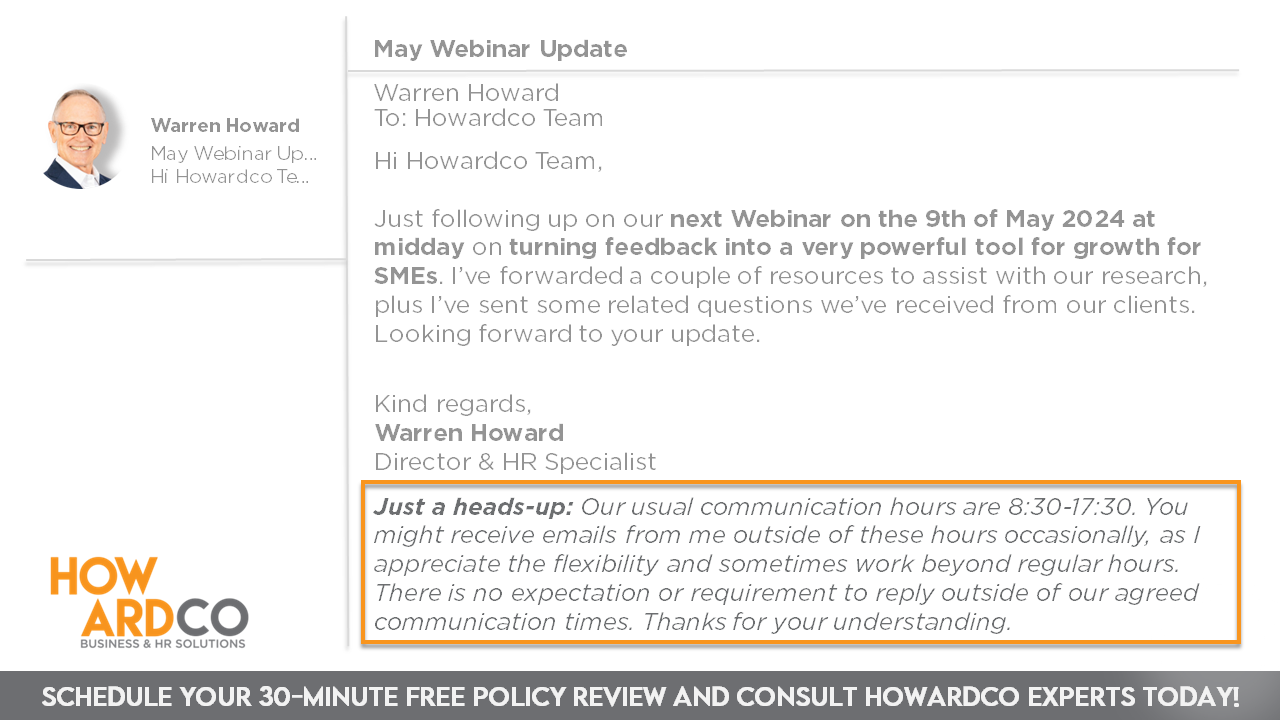HR Alert – Right To Disconnect
Welcome Back to Another HR Alert: The Right To Disconnect
The ‘Right to Disconnect‘ has recently been a hot topic in the media as part of Australia’s new ‘Closing Loopholes’ laws, causing concern.
We at Howardco understand that such discussions can lead to unnecessary stress, and as your trusted partners, we’re here to provide clarity and reassurance.
The Right to Disconnect is designed to protect employees’ well-being and work-life balance. Note that it will take effect on the 26th of August 2024, for employers with 15 or more employees and on the 26th of August 2025 for small businesses with fewer than 15 employees.
WHAT EXACTLY IS THE RIGHT TO DISCONNECT?
It will grant employees the power to decline work-related communication outside of their designated work hours.
Whether it’s calls, emails, or messages, employees will have the right to disconnect without fear of reprisal from their employers.
The media has widely covered the right to disconnect, sparking considerable confusion among the public and employers alike. In response, we’ve compiled a list of common misconceptions to address these concerns.
SOME COMMON MISCONCEPTIONS
❌ Will Employers be prohibited from contacting employees outside of official work hours.
✔️ Answer:
- The Right to Disconnect legislation will not explicitly forbid employers from reaching out after work hours. While it will be considered best practice for employers to refrain from late-night communication, occasional lapses won’t lead to penalties.
- Employees will retain the right to choose not to respond without facing reprisal.
- Employers will still maintain discretion to contact employees after hours, especially if it’s outlined in their job responsibilities or if they’re on call, albeit with an obligation to ensure fair compensation.
- Urgent operational matters, such as shift changes or office closures, may necessitate after-hours communication.
❌ The rule will be limited to employers.
✔️ Answer:
It will cover communication between employers and employees. Additionally, it will also involve third-party communication with clients or customers.
❌ Only employees will be able to raise a dispute.
✔️ Answer:
Either the employee or the employer will have the ability to initiate a dispute. For instance:
- An employee might raise concerns about not being allowed to disconnect or facing penalties for doing so.
- Conversely, an employer might dispute that the employee is not disconnecting properly, like by not responding to calls when on call or as agreed upon in their contract.
How To Resolve? The process of resolving disputes will be similar to other workplace procedures. Initially, the Act mandates an in-person discussion between the employer and employee in the workplace.
If the disagreement continues, either party will be able to ask the Fair Work Commission to intervene.
This could entail:
- Requiring the employer to cease contact or conduct that violates the Right to Disconnect.
- Mandating the employee to align their behaviour with the Right to Disconnect when inappropriate.
- Continued defiance of the stop order may result in consequences.
- Employers may face civil penalties of up to $18,784 per individual and $93,900 per contravention for a company.
- Employees may face disciplinary action.
Remember, even with a stop order in effect, employees still retain the right to file additional applications under the Work Health and Safety Legislation. This could include claims of breaching the duty of care by persistently contacting or expecting responses from the employee, particularly concerning psychosocial hazards at work.
❌ It will mean the end of flexibility.
✔️ Answer:
According to the December Quarter 2023 Work Outlook report from the Australian Human Resource Institute, 40% of employers have already implemented such policies.
While acknowledging flexibility concerns, there will be workarounds to ensure the Right to Disconnect still allows for a flexible work environment, which includes good communication and using available tools to balance flexibility while respecting everyone’s downtime.
For example:
- Agree on communication hours, whether that be from 9 to 5 or whichever your team agrees.
- Use the schedule message function in your email application to pre-post emails so that they arrive during agreed-upon work hours.
Despite worries about productivity dropping, research shows that allowing employees to disconnect can actually boost efficiency.
Source: AHRI HRM – Busting 4 Myths About the Right to Disconnect Legislation
WHAT DO YOU NEED TO PREPARE?
- Review current work hours and communication needs.
- Clearly define normal working hours for employees.
- Create a policy document on the Right to Disconnect.
- Set clear guidelines for exercising the Right to Disconnect.
- Establish a process for on-call allowances and overtime pay.
- Determine what counts as reasonable out-of-hours communications, like shift changes or work location updates.
- Encourage managers to lead by example through respecting boundaries around after-hours communication.
- Reflect on and adapt communication practices, where necessary.
- If you work with global clients, inform them of the Australian legislation and set expectations.
- Consider a statement in email signatures that states the communication hours while still remaining flexible, for example:

Disclaimer: The information provided is for general knowledge only and does not constitute legal advice. For specific inquiries, please reach out to us.
We offer a FREE 30-minute consultation to go through our policy checklist. CLICK HERE to schedule your complimentary policy check-up or to discuss any specific questions you may have regarding these IR changes.
HOW HOWARDCO CAN SUPPORT YOU!
At Howardco, our mission is to collaborate closely with our clients to achieve optimal outcomes. To this end, we provide the following services:
- In-depth research on current and forthcoming legislative changes and proposals.
- Expert guidance on best practices.
- Customised policy review, drafting, and tailoring to suit your unique business needs.
To schedule your 30-minute FREE Policy Review with our team, contact Howardco today!


















